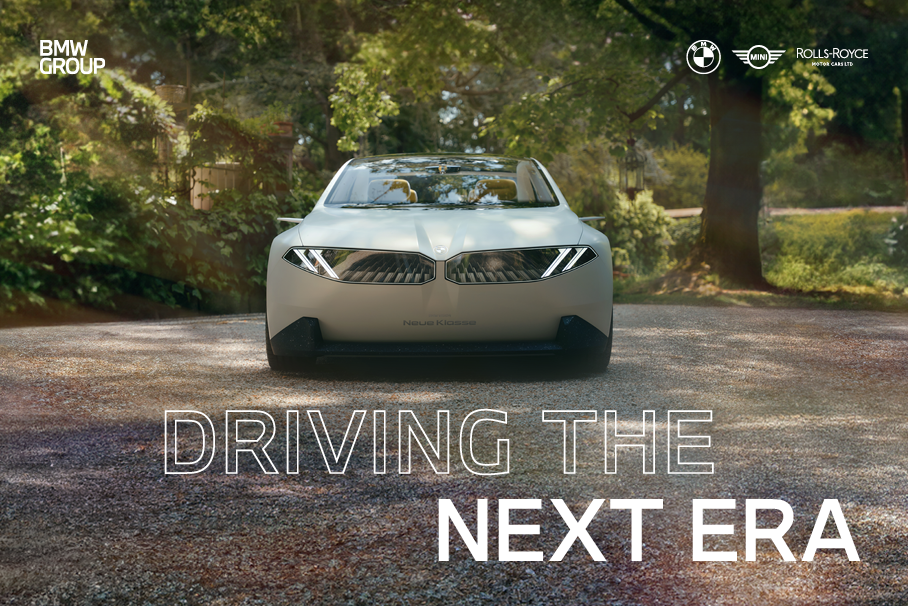BMW Group data ecosystem.
DATA IS THE NEW CODE.
The BMW Group has a long history of vehicle connectivity. Back in 1997, BMW installed the first SIM cards in vehicles, enabling “intelligent emergency calls” for the first time in the US. Since then, the company has put more than 14 million connected vehicles onto the roads. In a 24-hour period, this fleet drives 140 million kilometres, collecting information along the way – for example, from 25 million traffic signs. Over four million vehicles deliver traffic information in real time. Over the course of one day, the BMW Group fleet covers almost the entire German motorway network (98.5%).
The latest generation of BMW vehicles, equipped with BMW Driving Assistant Professional, has sensors that measure almost 30 kilometres of the road network every second, with an accuracy of within a centimetre: That adds up to more than 2.5 million kilometres of road per day. This is important because automated driving requires high-resolution, constantly updated digital maps for navigating and localising the vehicle.
The connected network grows with every new vehicle added. At the same time, the level of connectivity and in-car sensor technology, using cameras, radar, ultrasound and infrared, keeps on getting better. Vehicles are turning into intelligent high-tech devices that can perceive and process more of their surroundings. This information not only supports the functions of the respective vehicle; when shared across the fleet, all the other vehicles also benefit from this kind of “swarm intelligence”. In this way, each vehicle is provided with selected information and analyses from millions of others. If a vehicle registers icy conditions coming out of a bend and the information is validated, all drivers behind it are warned before they even perceive any danger.

In certain cases, it makes sense to combine real-time data with data from long-term analyses. In this way, fleet intelligence can even be used to make predictions. For instance, the vehicle not only shows the driver where to find parking spaces, but also how likely they are to still be vacant at the calculated time of arrival. Based on this data, a route can be calculated for the final stretch that maximises the probability of finding an empty parking space close to the destination. This saves the customer both time and stress. In Berlin, for instance, cars looking for parking spaces account for 40 percent of traffic (source: German Federal Government, 2017). Reducing the traffic caused by cars looking for parking spaces substantially reduces fuel consumption and emissions in cities, benefitting everyone.
Data is an essential part of developing innovative services and new features, as well as enhancing efficiency, quality and safety. The BMW Group processes data for specific purposes that benefit the customer, society and further development of mobility – ranging from local hazard warning and on-street parking information to personalisation of digital services. On the road to automated driving, data will be essential to train algorithms and validate driving functions virtually.
Even with all these benefits, our attitude is uncompromising: The BMW Group regards security and privacy as part of its premium brand promise and a key aspect of development. We provide our customers with transparency and control over the use of their data. Fleet data is processed only in anonymised form, without any references to the customer. We also protect the vehicle from unauthorised access by third parties; monetarisation of data is not what our business model is based on.
TRAFFIC AND PRODUCT-SAFETY DATA.
Personal vehicle data is stored in BMW and MINI CarData on BMW Group servers, where it can be viewed at any time by customers. The customer retains control and can decide whether and with whom they wish to share their vehicle data.
Vehicle data is anonymised before being processed by the company internally. This means all information with any references to persons is removed from the data set and only information required for specific purposes may be processed. For example, if a vehicle drives over a patch of icy road, the data record of this event is extracted. What remains is information such as “DSC activated, GPS position, time, temperature” but no information relating to the vehicle that registered the event. From this data set, we can then determine whether aquaplaning or ice were involved, but not identify which vehicle reported the event.
To identify and correct product defects in individual vehicles or a model series, it is necessary for partners and suppliers to receive data that can be assigned to a specific vehicle on a case-by-case basis. For this purpose, any references to persons are concealed by the use of a pseudonym to encode personal information, such as the vehicle identification number. This means a procedure can still be assigned to an individual vehicle, but the partners and suppliers have no way of tracing the vehicle identification number or the owner. If analysis of the data indicates that safety-related service is needed, the BMW Group then decrypts the pseudonym for that specific purpose and is able to contact the vehicle’s owner.
The VDA* and ACEA* define data categories that are relevant to road safety, traffic management and product or service quality. This data is anonymised or pseudonymised accordingly in the BMW Group backend.
In doing so, the BMW Group follows current legislation, such as the EU GDPR, Federal Data Protection Act or applicable laws. This also applies to the transmission of personal data to third parties, including law enforcement agencies or other public bodies.
FULL TRANSPARENCY AND CONTROL FOR OUR CUSTOMERS.
The BMW Group aims to ensure customers always have control and transparency over their vehicle data. The data protection notice can be viewed online at any time. The settings for how much and which data from the vehicle may be shared can be viewed and changes made in the data protection menu in the vehicle* and on the ConnectedDrive website. For easy selection, four simple levels are offered from "All services incl. analysis" to "No services".
Example: If the customer selects "No services", the vehicle behaves like a smartphone in "airplane mode” and no data is transmitted. The only exception to this is the legally required eCall, which automatically sends information to the rescue coordination centre in the event of a collision.
The customer can customise, activate and deactivate more than 30 vehicle services in a very granular way, depending on the vehicle equipment. However, the driver, vehicle and fleet work best as a team: The more anonymised data is shared, the better the analytics, forecasting and safety alerts that can be provided to all customers.
A number of services only work if the appropriate data is transmitted. One example of this is learning customer preferences. For vehicles to be able to set certain comfort functions automatically for the individual customer, the user profile data must first be evaluated. It is then possible for the vehicle to make personalised route guidance suggestions, for instance.
The “traffic information” example illustrates how important it is to share real-time data on traffic conditions, hazards and expected delays within the fleet. If every customer driving their vehicle shares the information collected in anonymous form, this improves the data basis and makes route optimisation safer and more accurate. Forecasting traffic conditions, hazards or delays benefits all customers who share their data.
Here you can find more information about data protection at BMW.
*Data protection menu varies according to model generation and vehicle equipment.
INNOVATIVE SERVICES WITH BMW AND MINI CARDATA.
BMW and MINI customers can request a data archive of BMW and MINI CarData at any time through the BMW ConnectedDrive or MINI Connected customer portal to obtain an overview of their telematics data stored at the time of the request. In addition, customers can actively use CarData to pass on data to service providers, such as insurance companies or workshops, so they can take advantage of personalised services.
Personal telematics data is stored without exception on the company's own CarData platform. Customers retain control over their data at all times and can decide for themselves whether they want to delete data, share it with third parties or withdraw consent already granted. Customers can also choose to share data with a service provider in this way. Service providers such as workshops or insurance companies can register with BMW and MINI CarData. If a customer wishes to use a specific service and has actively given instructions for the data to be transferred, the requesting company receives the data needed for the service via an encrypted connection to CarData.
As a member of the VDA and the ACEA, the BMW Group supports privacy principles focused on transparency, customer self-determination and technical protection of the vehicle data. CarData is a secured central server with clearly defined technical and competition rules in accordance with the "Extended Vehicle" approach set out in ISO Standard 20078.
LINKS TO DATA PLATFORMS.
Data marketplaces serve as platforms where data can be exchanged between different parties. This enhances both in-house and third-party services and helps improve overall road safety and efficiency, for instance.
For example, one use case is the exchange of traffic-relevant fleet data in real time. Since mid-2019, the BMW Group has provided free access to safety-related traffic data for non-commercial purposes. Companies from other industries, start-ups, institutions and even government agencies can also obtain the data they need via platforms. The BMW Group only shares anonymous fleet data without any references to persons via platforms.
The BMW Group provides the Open Location Platform Marketplace HERE with safety-related traffic data, such as accident and slippery road warnings. Once data is licensed by the BMW Group, third parties can also access this data. This exchange of data can continuously improve safety-related services, such as local hazard warning or on-street parking information. Developers, service providers and institutions such as traffic control centres can access the the safety-related data free of charge for non-commercial purposes. The BMW Group considers road safety part of its social responsibility.
Click here for more information on the HERE OLP marketplace.
Traffic data is also transmitted to Otonomo. In this case, Otonomo serves as an open platform. The BMW Group provides anonymous and aggregated data from the vehicle fleet, including from traffic identification and traffic flow to third parties. Unlike in the case of HERE, data licensing is not handled by the BMW Group itself but directly through Otonomo. In this way, service providers, start-ups and even institutions can access data without discrimination in order to develop innovative services and business segments.
Click here for more information on Otonomo's Data Services Platform.
SECURITY AND PRIVACY.
The BMW Group's data strategy is based on fundamental principles that determine how it acts and how it handles data to ensure security and privacy at all times:
- Vehicles are not directly connected to the internet, but via a secure connection to the BMW Group backend (virtual private network). For security and safety reasons, no third party is given direct access to the vehicle.
- This also ensures no personal data can be transferred to third parties without the customer's consent.
- Personal data is protected by the BMW Group and can be viewed by the customer at any time. Personal data is only shared with third parties at the express request of, and after confirmation by, the customer.
- The BMW Group shares data with third parties to improve products, services and general road safety. This data is anonymised beforehand and does not contain any references to persons.
- Monetisation is not what our business model is based on.
- The BMW Group follows current legislation, such as the EU GDPR, Federal Data Protection Act and applicable laws.
State: July 2020


